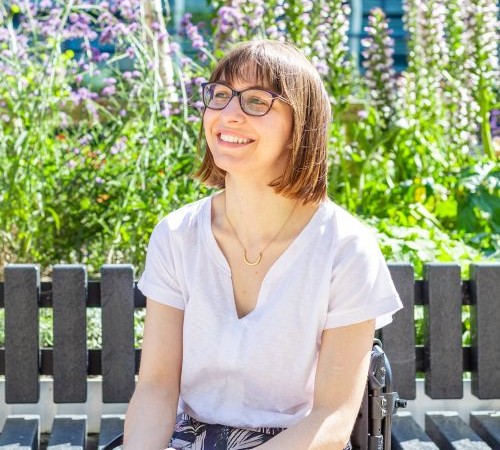Career change
Elena’s path into engineering hasn’t been a conventional one. She originally studied fine art at university and spent six years working as an art technician and an artist. But the demanding workload and physical nature of the job, alongside her disability, left her feeling drained. “My dad was an engineer, and I would often ask for his advice on my most complex art projects,” she says. “I realised that engineering would allow me to be creative but would be more sustainable for me long term.” After completing an online access course, she started apart-time degree in mechanical engineering at the University of Plymouth. She is now in her fourth year and hasn’t looked back.
Engineering needs people from diverse backgrounds to help identify and prevent design problems.

Inspiring others
Elena is using her voice, and her ELS funding, to encourage other disabled and neurodivergent people to consider a career in STEM.
“I feel strongly that there should be more disabled people in engineering,” she says. “Women currently make up 15.7% of the UK engineering workforce, and disabled people just 11% of it. When you look at me, a disabled woman with an arts background, I’m the least likely person to be an engineer.”
Telling her story
Elena spent some of her funding on an intensive week-long public speaking course in London. “It was brilliant! I was nervous at first, but I must have given about 50 speeches by the end of the week. I took onboard the tips and advice and feel much more confident speaking publicly now.”
She is also using the funding to learn British Sign Language, something she is really enjoying. “I’m passionate about equality, diversity and inclusion,” she says. “As a disabled person, I have my own experiences of feeling excluded by society. I thought, if I want people to listen to what I’m saying, I need to be doing something to help another community as well.”
The final part of her funding will be spent on a non-fiction creative writing course. “There are two ways that I would like to tell my story – through public speaking and through the written word,” she says. Elena has already written a poetry book inspired by engineering called Woven Paths, published by Shoals of Starlings Press.
“I made great use of an ELS peer-to-peer group where we paired up and worked towards a personal goal. The sessions held me accountable to meet my goal of publishing a poetry collection by the end of September 2025. It goes to show that the ELS will support you in things you are passionate about."
Champion of inclusivity
As a wheelchair user, Elena uses her personal experiences to champion inclusivity in engineering and construction. She is co-chair for her university’s equality, diversity and inclusion student committee and is also a trustee at Construct Ability, an organisation that advocates to make construction accessible to everyone.
Her advocacy was recently recognised by the Women’s Engineering Society, who named her as one of the 2025 Top 50 Women in Engineering. She was nominated by Vince Pizzoni, who interviewed Elena for the ELS and has since become a mentor to her. “I didn’t expect it, it’s quite surreal. I went to the event in London and there were so many incredible women in the room. I was really proud to be part of it."
Alongside her degree, Elena is a trainee engineer at Fishtek, a fisheries and engineering company. Fishtek provides innovative solutions to the problems facing fish populations in both freshwater and marine environments. “It is a really interesting place to work, and it feels amazing to be part of something making such a positive environmental impact,” she says.
Interested in participating in the Engineering Leaders Scholarship?
Visit the programme pages to find out more about how it could benefit you and your career.
